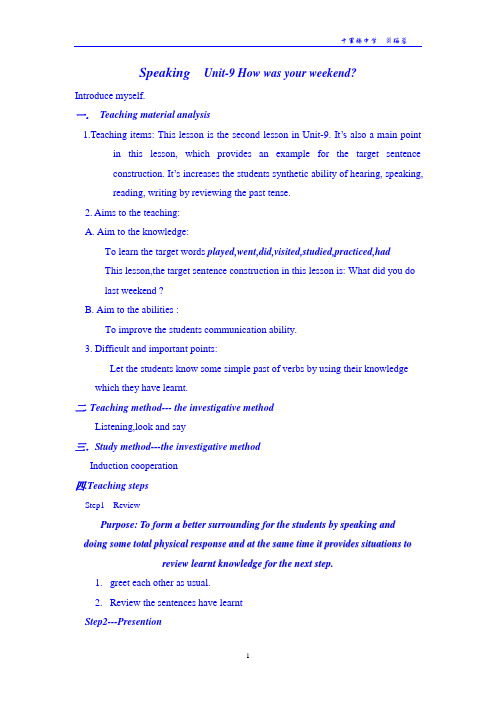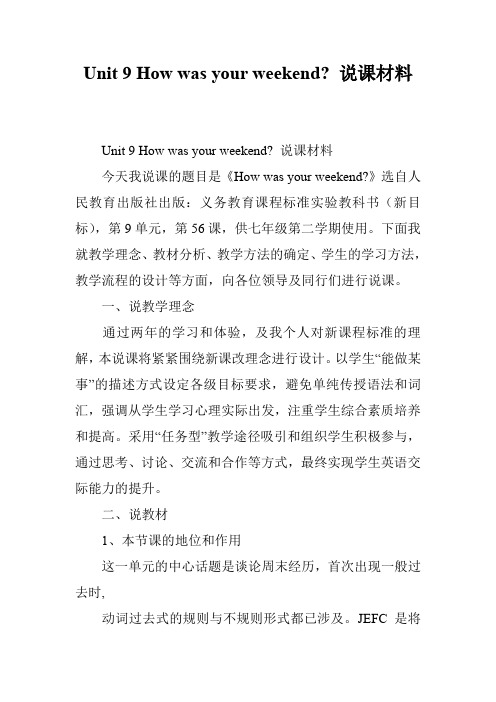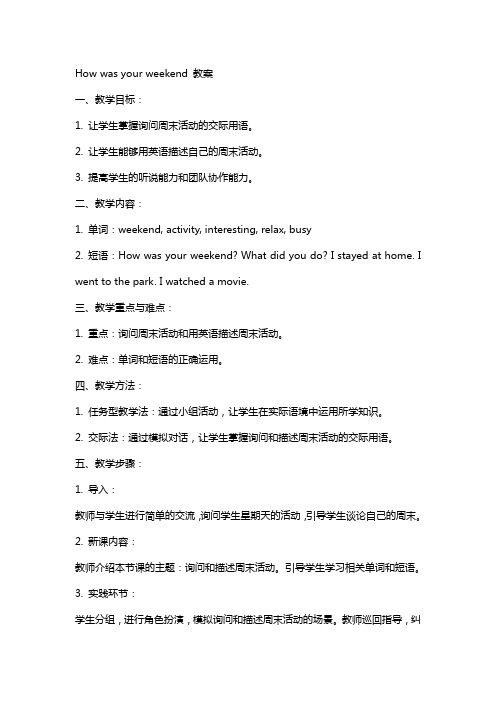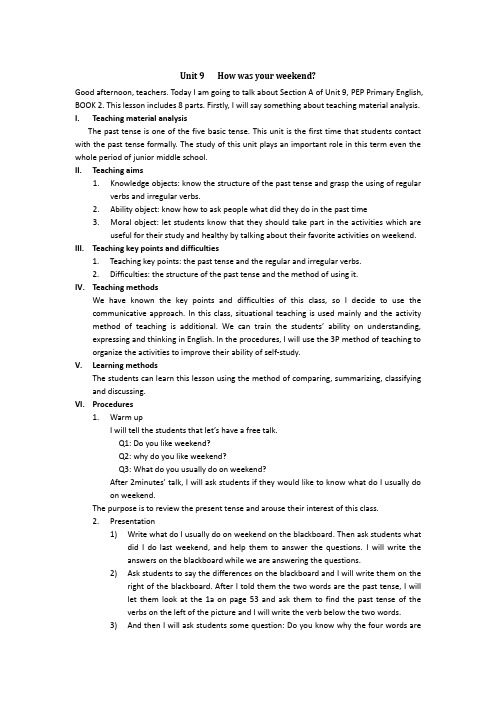Unit 9 How was your weekend- 说课材料
- 格式:doc
- 大小:26.50 KB
- 文档页数:5

Speaking Unit-9 How was your weekend?Introduce myself.一.Teaching material analysis1.Teaching items: This lesson is the second lesson in Unit-9. It’s also a main pointin this lesson, which provides an example for the target sentenceconstruction. It’s increases the students synthetic ability of hearing, speaking,reading, writing by reviewing the past tense.2. Aims to the teaching:A. Aim to the knowledge:To learn the target words played,went,did,visited,studied,practiced,hadThis lesson,the target sentence construction in this lesson is: What did you dolast weekend ?B. Aim to the abilities :To improve the students communication ability.3. Difficult and important points:Let the students know some simple past of verbs by using their knowledge which they have learnt.二. Teaching method--- the investigative methodListening,look and say三.Study method---the investigative methodInduction cooperation四.Teaching stepsStep1---ReviewP u r p o s e:T o f o r m a b e t t e r s u r r o u n d i n g f o r t h e s t u d e n t s b y s p e a k i n g a n dd o i n g s o me t o t a l p h y s i c a l r e s p o n s e a n d a t t h e s a m e t i m e i t p r o v i d e s s i t u a t i o n s t or e v i e w l e a r n t k n o w l e d g e f o r t h e n e x t s t e p.1.greet each other as usual.2.Review the sentences have learntStep2---PresentionThe purpose is to present the key words for the students to learn and grasp the meaming. CAI providea a real situation for students to understand the conversation better.Step 3. The study of diffuse thought.Purpose:In order to raise students English level, I will teach them word-building --how to change present tense into past tense.Step 4.practicePurpose:It’s important for students to speak English as much as possible in class or after class.It’s nesesseny for them to practice the conver sationsIn this lesson, We have learnt some words and sentences about the pasttense .Ss can use these to ask and answer about weekend imfamation.Design of blackboardUnit 9 how was your weekend?Period TwoWhat did you do last weekend?I played tennis. play-playedcleaned my room visit--visitedwatched TV practice—practicedstudy—studieddo—didgo—wenthave—had。

How was your weekend 教案一、教学目标1. 让学生能够用英语询问和回答关于周末的活动。
2. 让学生能够描述自己的周末活动,并能够用英语进行简单的交流。
3. 提高学生的英语听说能力和词汇量。
二、教学内容1. 词汇:movie, shopping, visit, cook, beach2. 句型:How was your weekend?What did you do?I watched a movie./I went shopping./I visited my grandparents./I cooked dinner./I went to the beach.三、教学步骤1. 热身(5分钟)教师与学生进行简单的对话,询问学生的一些基本信息,如姓名、年龄、年级等。
引导学生谈论一下他们的周末活动。
2. 引入新词汇(10分钟)教师展示与周末活动相关的图片,如看电影、购物、探亲访友、做饭、海滩等,并引导学生用英语描述这些活动。
教师将新词汇写在黑板上,如movie, shopping, visit, cook, beach等。
3. 学习句型(10分钟)教师引导学生用新学的词汇进行句型练习,如:How was your weekend?What did you do?I watched a movie./I went shopping./I visited my grandparents./I cooked dinner./I went to the beach.4. 小组活动(15分钟)学生分成小组,用英语互相询问周末活动,并记录下每个同学的回答。
每个小组选出一个代表进行汇报。
5. 总结与作业(5分钟)教师对本次课程进行总结,强调重点词汇和句型。
布置作业:用英语写一篇关于自己周末活动的短文。
四、教学评价1. 观察学生在课堂上的参与程度和口语表达能力。
2. 课后收集学生的作业,评估他们对词汇和句型的掌握程度。

Unit 9 How was your weekend? 说课材料Unit 9 How was your weekend? 说课材料今天我说课的题目是《How was your weekend?》选自人民教育出版社出版:义务教育课程标准实验教科书(新目标),第9单元,第56课,供七年级第二学期使用。
下面我就教学理念、教材分析、教学方法的确定、学生的学习方法,教学流程的设计等方面,向各位领导及同行们进行说课。
一、说教学理念通过两年的学习和体验,及我个人对新课程标准的理解,本说课将紧紧围绕新课改理念进行设计。
以学生“能做某事”的描述方式设定各级目标要求,避免单纯传授语法和词汇,强调从学生学习心理实际出发,注重学生综合素质培养和提高。
采用“任务型”教学途径吸引和组织学生积极参与,通过思考、讨论、交流和合作等方式,最终实现学生英语交际能力的提升。
二、说教材1、本节课的地位和作用这一单元的中心话题是谈论周末经历,首次出现一般过去时,动词过去式的规则与不规则形式都已涉及。
JEFC是将一般过去时编排在初二(上),分三个单元落实动词的过去式形式。
比较老教材,我们的教学任务提前了一个学期,单位时间内要完成的教学内容也扩充了三倍。
学生不仅要会谈论过去经历而且要学会运用一般过去时的意识和技巧。
可以说,知识容量大,学习任务重,学生在心理上可能一下子适应不过来。
这将给我们的教学带来了一定的难度。
2、本课的重点和难点本节课的学习任务是:通过听Sally 和Jim谈论上周的对话,进行听力练习,从而复习和巩固刚刚学过的一般过去时态,并培养和提高学生的听力水平。
所以我确定本节课的教学重点为训练学生对于一般过去时听力方面的感知能力。
难点为对于较难的听力任务,如何指导学生适当的听力技巧。
3、学生分析七年级下的学生,掌握了一定英语语言知识,也有一定的交际能力,布置给他们一些解决问题型号任务,使他们体验用英语解决问题的成就感,能增强进一步学好英语的动力。

How was your weekend 教案一、教学目标:1. 让学生掌握询问周末活动的交际用语。
2. 让学生能够用英语描述自己的周末活动。
3. 提高学生的听说能力和团队协作能力。
二、教学内容:1. 单词:weekend, activity, interesting, relax, busy2. 短语:How was your weekend? What did you do? I stayed at home. I went to the park. I watched a movie.三、教学重点与难点:1. 重点:询问周末活动和用英语描述周末活动。
2. 难点:单词和短语的正确运用。
四、教学方法:1. 任务型教学法:通过小组活动,让学生在实际语境中运用所学知识。
2. 交际法:通过模拟对话,让学生掌握询问和描述周末活动的交际用语。
五、教学步骤:1. 导入:教师与学生进行简单的交流,询问学生星期天的活动,引导学生谈论自己的周末。
2. 新课内容:教师介绍本节课的主题:询问和描述周末活动。
引导学生学习相关单词和短语。
3. 实践环节:学生分组,进行角色扮演,模拟询问和描述周末活动的场景。
教师巡回指导,纠正发音和语法错误。
4. 小组活动:学生分组,根据题目要求,用英语描述自己的周末。
教师评价并给予反馈。
5. 总结与作业:教师对本节课的内容进行总结,布置作业:用英语写一篇关于自己周末的短文。
六、教学评价:1. 课堂参与度:学生参与课堂活动的情况。
2. 口语表达能力:学生描述周末活动的准确性及流利程度。
3. 小组协作能力:学生在小组活动中的表现。
七、教学反思:教师在课后对教学效果进行反思,针对学生的掌握情况,调整教学策略,以提高教学效果。
八、教学拓展:1. 举办一次关于周末活动的英语角,让学生展示自己的成果。
2. 组织一次英语晚会,让学生在轻松的氛围中运用所学知识。
九、教学资源:1. 教材:人教版《英语》2. 课件:教师自制的PPT3. 录音机、磁带(可选)十、教学时间安排:1课时(40分钟)六、教学准备:1. 教师准备相关教学材料,包括课件、单词卡片、活动指南等。

Unit 9 How was your weekend?Topic: Weekend activitiesFunctions: Talk about recent past eventsStructures:Simple past of regular and irregular verbsWhat questionsHow was your weekend? (formulaic)Target language:What did you do last weekend?On Saturday morning I cleaned my room.On Saturday evening I went to the movies.How was your weekend?It was great.Teaching StepsPeriod 1Good morning everyone! We have finished Unit 8. Today we are going to learn a new unit—Unit 9.Step 1: Lead inAsk and answera. Can you tell me what the title of Unit 9 is? Yes, it’s How was your weekend? What do you think the unit is about?b. Yes. In this unit we are going to talk about recent past events.Step 2: Section A 1aFirst, please open your books at Page 53 and look at activity 1a.1. Look and findLet’s look at activity 1a and find what the phrases mean.2. MatchYou know what the phrases mean. Please match them with the pictures.3. Check the answersHave you finished? Let’s check the answers one by one.Answers: 1. d 2. b 3. f 4. c 5. e 6. a4. Reada. Please read the phrases after me. Did my homework …b. Let’s read them together.c. Would you please read them one by one?Step 3: Section A 1b1. Listen and writea. Listen to the tape.b. Let’s write the day and “morning”, “afternoon” or “night” below each picture.2. Check the answersLet’s check the answers.Answers: Picture a: Saturday nightPicture b: Sunday afternoonPicture c: Saturday afternoonPicture d: Sunday nightPicture e: Saturday morningPicture f: Sunday morning3. Reada. I would like you to read the conversation together.b. Would you please read it by yourselves three times?c. This time I would like you to read it twice with your partner.d. Who would like to read in class?Step 4: Section A 1cPairwork1. ReadWould you please read the conversation in 1c with your partner?a. Imagine you are Lucy and your partner is Lucy’s friend. Would you please make conversations with your partner to talk about the activities in the picture?b. Who would like to have a try in class?Step 5: Section A 2a1. ListenNow class, let’s move to activity 2a now. Please listen to the tape for the first time2. UnderlinePlease underline the words you hear when you listen to it for the second time.3. Check the answersHave you finished? Please check your answers with your partner and see whether your answers are the same. Let’s check them together.Answers:Underlined items: grandmother, homework, math, beach, tennisStep 6: Section A 2b1. Listen and writea. Listen to the conversation for the first time.b. Please write “C” for Carol, “B” for Ben or “E” for Emma next to the statements in 2a.2. Check the answersHave you finished? Let’s check them.Answers: 1. E 2. E 3. B 4. C 5. C3. Reada. Let’s read the conversation together.b. I would like you to read it by yourselves.c. Who would like to have a try to read it in class?Step 7: Section A 2ca. Now class, let’s move to activity 2c. Would you please practice the conversation in 2c with the information in the box?b. Who would like to have a try in class?c. Well done. Please pay attention to the past forms of the verbs in the phrases.Step 8: Grammar Focus1. ReadRead the sentences in the grammar box.2. Point out the notesSimple past tense Regular verbs Irregular verbsStep 9: SummarizeLet’s summarize what we learnt in this period.Step 10: Homework1. Copy the words in activity 1a and the sentences in the grammar box.2. Read the tapescript of activity 2a and 2b.Period 2Step 1: Lead inWhat did we learn in Period 1? Who can tell us? Yes.We got to know how to talk about simple past tense. Besides them, we learnt some regular verbs and some irregular verbs. Do you still remember how to say them? OK. Let’s review them first.Step 2: Revision1. Ask and answera. Would you please write down the past forms of following words? 做作业、去海滩……b. Please practice in pairs. Student A says in Chinese and student B translates it into English.2. DictationPlease take out your dictation exercise books and let’s have a dictation.Step 3: Section A 3a1. Complete and numberToday, let’s move to a new part of Unit 9. Would you please look at acti vity 3a on Page 55? Complete the conversation and write numbers from 1 to 3 in the blanks.2. Check the answersI think all of you did well.Answers: 3, 2, 13. Reada. Read it with your partner. If you have any new words, please look them up in the word list or ask me for help.b. I would like you to read it together.c. Would you like to read it in class? Please have a try.4. ExplainHow was your weekend?studied forStep 4: Section A 3bPairworka. Just now, we learnt how to ask about the weekend. Now, I would like you to do a pairwork to ask and answer questions about Ming’s, Tony’s, and Sarah’s weekends from 3a.b. Who would like to have a try in class?Step 5: Section A 4Game—What did you do?Just now, we talked about Ming’s, Tony’s and Sarah’s weekends. How was your weekend? What did you do on your weekend? Let’s play a game guessing what you did. I would like to invite some students to draw pictures of two things you did last weekend. Others guess what you did.Step 6: SummarizeLet’s s ummarize what we learnt in this period.Step 7: HomeworkCopy and try to recite the conversations in 3a.Period 3Step 1: Lead inGood morning, boys and girls. Shall we continue our lessons? Could you please tell me what we learnt in Section A? Yes. We learnt to talk about the weekend.Step 2: RevisionReviewa. I will show you some pictures and please make conversations.b. Let’s have a dictation.Step 3: Section B 1a1. Looka. In Section A, we learnt some verbs and some verb phrases. In Section B, we are going to learn more.b. Open your books at Page 56. Would you please look at activity 1a?c. Look at the words and the pictures.2. MatchPlease match the words with the pictures.3. Check the answersHave you finished, everyone? Let’s check them together.Answers: 1. b 2. d 3. a 4. cStep 4: Section B 1bDrawa. Let’s move to activity 1b. Do you think the activities in 1a are fun or not fun? Draw a happy face or an unhappy face under each picture.b. Would you please tell your partner what you think about them?Step 5: Section B 2a1. Listen and completea. Let’s move to activity 2a now. It is a listening exercise. For the first time, I would like you to listen only.b. Now, for the second time, please listen to it again and complete the chart in activity 2a.2. Check the answersI think most of you have finished it. Let’s check them together.Answers: Sally: cleaned her roomdid her homeworkwent to the libraryJim: played soccerwent to a movievisited his friend3. Read the tapescripta. Let’s read the tapescript together.b. Would you please read the tapescript in pairs?c. Please translate the tapescript into Chinese in pairs.d. Who would like to read in class?Step 6: Section B 2bPairworkSuppose you are Sally and Jim. Would you please talk about your weekend with the information from 2a?Step 7: Section B 2cPair workTask—A surveya. Let’s perform a task now. Six students form a group. Everyone ask others what they did last weekend and fill in the chart.Example: A: What did you do last weekend?B: I did my homework.…b. Give us a short report to tell us what your friends did last weekend.Example: I interviewed some of my friends what they did last weekend. Mary did her homework …Step 8: SummarizeLet’s summarize what we learnt in this period.Step 9: HomeworkPractice activity 2a in Section B.Period 4Step 1: Lead inWe have finished the most part of Unit 9. And in this period, we will continue to finish Section B. But before that, I would like you to review what we learnt before.Step 2: Revision1. Make a speechCan you make a speech to tell us what you did and how your weekend was?2. DictationLet’s have a dictation.Step 3: Section B 3a1. Reada. Let’s go into activity 3a on Page 57. There is an article about kids’ weekend.b. Please read it by yourselves. If you have any questions, please ask me.c. I would like you to read it together.2. UnderlinePlease underline all the past tense verbs in the article.3. Check the answersI think most of you have finished. Please check your answers with your partner.4. ExplainLet me explain some key words and phrases to you.spend for on Saturday afternoon went to sw. watch a movie visit sb. play sportsStep 4: Section B 3b1. Look and fillThere is another article and some pictures. Would you please fill in the blanks according to the pictures given below?2. Check the answersI think most of you have finished it. Let’s check them. Would you please read your article to your friends and see whether your answers are the same.Answers: 1. cleaned my room 2. did my homework 3. visited my aunt4. went to the library5. played soccer6. watched TV3. Reada. Let’s read the article together.b. Please read it by yourselves this time.c. Who would like to have a try to read it in class?Step 5: Section B 3cTask—This was my last weekend.a. Let’s perform a task n ow. Just now, we read two articles in 3a and 3b. Please write your own last weekend. You may follow the examples in 3a and 3b.b. Please share your article about the weekend with your friends.c. I would like to invite some of you to read your article in class.Step 6: Section B 4Game—Who am I?Imagine you are a famous person. Write what you did last weekend. Then talk to your partner about your weekend activities. Your partner tries to guess who you are.Step 7: SummarizeLet’s summarize what we learnt in this period.Step 8: HomeworkTry to recite the article in 3a.Period 5Step 1: Lead inWe have spent four periods on Unit 9. This is the last period of Unit 9. In this period, we will do some exercises and make sure you learn this unit well.Step 2: Self-check-11. Check the words and the phrases you knowOpen your books and look at Self-check-1. If you know the words and the phrases well, please check them.2. ReadI would like all of you to read the words and the phrases together.Step 3: Self-check-21. Do you have any other words you don’t know? Please write them in your exercise books.2. Please ask your friends for help.3. Looking up the dictionary is also a good way to study English. I hope you can get more from dictionaries.Step 4: Self-check-31. Reada. Let’s move to Self-check-3 now. Please read the story about Old Henry by yourselves.b. Who would like to read it in class?2. Writea. Imagine you work for the Heartwarming Project. Would you please write a report about how you helped Old Henry last weekend?b. I would like you to share your report with your partner.c. Who would like to read your report in class?3. ExplainThere are some important phrases and words I would like to explain to you.enjoy go for a walk watch Wang Wang play play with it was time to do sth. look for want to do sth. not … anything Step 5: SummarizeLet’s summarize what we learnt in this period.Step 6: Homework1. Do the exercises on the Studen ts’ Book and the textbook.2. Review Unit 9.3. Watch the pictures in Just for fun on Page 58.人教版七年级英语《Unit 9 How was your weekend?》教案一、教学目标知识目标:学生能够掌握并正确使用一般过去时态的动词形式,包括规则动词和不规则动词的过去式,能够描述过去的活动和事件。

Unit 9 How was your weekend?Good afternoon, teachers. Today I am going to talk about Section A of Unit 9, PEP Primary English, BOOK 2. This lesson includes 8 parts. Firstly, I will say something about teaching material analysis.I.Teaching material analysisThe past tense is one of the five basic tense. This unit is the first time that students contact with the past tense formally. The study of this unit plays an important role in this term even the whole period of junior middle school.II.Teaching aims1.Knowledge objects: know the structure of the past tense and grasp the using of regularverbs and irregular verbs.2.Ability object: know how to ask people what did they do in the past time3.Moral object: let students know that they should take part in the activities which areuseful for their study and healthy by talking about their favorite activities on weekend. III.Teaching key points and difficulties1.Teaching key points: the past tense and the regular and irregular verbs.2.Difficulties: the structure of the past tense and the method of using it.IV.Teaching methodsWe have known the key points and difficulties of this class, so I decide to use the communicative approach. In this class, situational teaching is used mainly and the activity method of teaching is additional. We can train the students’ability on understanding, expressing and thinking in English. In the procedures, I will use the 3P method of teaching to organize the activities to improve their ability of self-study.V.Learning methodsThe students can learn this lesson using the method of comparing, summarizing, classifying and discussing.VI.Procedures1.Warm upI will tell the students that let’s have a free talk.Q1: Do you like weekend?Q2: why do you like weekend?Q3: What do you usually do on weekend?After 2minutes’ talk, I will ask students if they would like to know what do I usually doon weekend.The purpose is to review the present tense and arouse their interest of this class.2.Presentation1)Write what do I usually do on weekend on the blackboard. Then ask students whatdid I do last weekend, and help them to answer the questions. I will write theanswers on the blackboard while we are answering the questions.2)Ask students to say the differences on the blackboard and I will write them on theright of the blackboard. After I told them the two words are the past tense, I willlet them look at the 1a on page 53 and ask them to find the past tense of theverbs on the left of the picture and I will write the verb below the two words.3)And then I will ask students some question: Do you know why the four words aredifferent? Why the words“do”become “did”, “go”become “went”, “play”become “played”and “clean”become “cleaned”? After them expressingthemselves, tell them the former two words are irregular verbs and the latter twowords are regular verbs.The purpose is to let students know the structure of the pasttense and the form of the regular verbs and irregular verbs.3.Practice1)1a: At first, I will let students open the book at page 53 and look at the picturenamed d in the picture bubbles. Then I’ll ask students a question: what did the girldo? After they answered the question, ask them look at the chart on the left ofthe picture. Tell them the reason why there’s a letter d in the blank. I will makesure each student understands how to do and let them fill the blanks. Check theanswer after 3 minutes.2)1b: Then I will let the students listen to the tape and write morning, afternoon ornight after the words in the picture. Of course I will make sure that each studentknow how to do .Then I will play the tape for the first time and I will tell studentjust listen. Then play it a second time and pause a seconds when it’s necessary andask the students complete the activity individually.3)1c: I will tell students that I’m going to play the tape for the f irst time and they justlisten. Then play it a sec ond time and pause a seconds when it’s necessary and askthe students complete the activity individually.The purpose is to train students’ ability of understanding, listening and speaking.4.ProductionGive each student two cards and let them write their favorite weekend activities andtheir name. Then collect all the cards and pick up one from the cards and read thename on the cards. Ask the student come to the lectern and let the student do what hewrote in the card. Let the rest student guess what the activity is.The purpose is to help the students to grasp the past tense while they’re playing games. VII.SummaryThis class we’ve learnt some verbs and the structure of past tense. I think the theme of this class is clear. From being interested, to learning, to expressing, the students use English more and more. In the meanwhile, they become conscious of the past tense through the teaching activities and the game.。
初中英语说课稿-《Howwasyourweekend》说课稿范文各位读友大家好,此文档由网络收集而来,欢迎您下载,谢谢说课稿Goforit!Grade7Unit9Howwasyourweekend?一、说教材1.本单元教材的地位和作用。
动词的一般过去时是英语五种基本时态中最常用的时态之一,而本单元是Goforit!教材中第一次正式接触一般过去时,通过学习,让学生在基本掌握动词现在进行时和一般现在时的基础上,跨入一个新的认知领域,即对过去活动的表达。
因此,本单元教材在整个七年级下期乃至整个初中阶段,都有着极为重要的地位。
2.教学目标的确立及其依据。
本单元的整体语言目标,即LanguageGoal,是“谈论最近的过去所发生的事情”。
教材的安排也是通过听说读写各种活动,使学生学会如何谈论过去发生的事情。
本课时作为本单元的第一课时,学生对过去时的概念几乎一无所知,他们即使在表达现在的概念时,对已经学过的一般现在时和现在进行时也常常搞混。
因此,本节课需要对常用动词的一般现在时作一定的复习,在此基础上引出一般过去时,通过听、说和写的训练逐步领会其用法。
本课时教学目标确定为:知识与技能A.初步领会一般过去时的概念及构成;B.基本掌握play,clean,watch等规则动词和do,go,be等不规则动词的过去时的用法;c.学会运用Howwasyourweekend?whatdidyoudolastweekend?两个特殊疑问句及其回答。
过程与方法要求学生通过归纳和对比一般现在时态用法的基础上,通过课堂所设置的听、说、写的训练,逐渐领会一般过去时的用法。
情感目标通过谈论学生所喜爱的周末活动,以及对自己和同伴的周末活动进行评价,引导学生在业余时间积极参加有益于身心健康和学习的活动。
3.重点、难点和关键点的确立及其依据。
一般过去时态是课程标准要求学生掌握的重要时态之一,本课是该项语法教学的第一课,要对学生进行正确的语言输入,为以后的教学打下坚实的基础。
Unit 9 How was your weekend ?第一课时(Section A 1a-1c)说课稿【七年级英语(下)Go for it !】湖南省永州市江华瑶族自治县创新实验学校李永香一、说教材本课时是新目标版七年级(下) Unit 9 How was your weekend ?的第一课时。
本单元的主要学习任务是学会谈论周末从事的活动,并对已过上一周的周末进行评论。
因为本单元的中心话题是谈论周末从事的活动,并对已过上一周的周末进行评论并围绕这话题而展开听、说、读、写的活动。
本单元的语言目标是讨论曾经的活动或过去发生的事件,要求学生掌握的语法知识就是一般过去时。
通过本单元的学习,使学生掌握描述周末从事的活动的提问,学会准确表达周末从事的活动,并对已过上一周的周末进行评论,进而体验英语文化与实际生活的密切联系,使学生能够在实践中体会到学习语言的乐趣,透彻地掌握并的运用目标语言,培养学生在实际生活中综合运用所学语言的能力。
一般过去时这一时态在Go for it!这里这是第一次出现,也是攻克这一单元重难点的关键。
本节课的基点是学生要初步了解动词过去式并能掌握本课的动词过去式并引导学生学习掌握动词的过去式的正确运用,以及对过去时态的初步判断。
由于本节课的背景知识特别贴近学生的生活实际,并为学生开启正确运用过去时态描述他们的日常生活的新知识。
在提高学生应用语言能力的同时,也有利于培养他们对英语的学习兴趣,也对unit10教学起到了奠基作用。
本课时涉及到了询问并回答周末从事的活动的的句型另外,本课时还涉及到了last weekend ,on Saturday morning etc.表达过去时间短语。
鉴于此,本单元尤其是本课时的学习在初中英语学习中占有非常重要的地位。
本课时的内容不仅仅让学生学会了学会谈论周末从事的活动,和学生的实际生活贴切,便于情景话题的创设,以便更好的运用语言的能力,让学生了解中西语言文化的差异。
Unit 9 How was your weekend? 说课材料
Unit 9 How was your weekend? 说课材料
今天我说课的题目是《How was your weekend?》选自人民教育出版社出版:义务教育课程标准实验教科书(新目标),第9单元,第56课,供七年级第二学期使用。
下面我就教学理念、教材分析、教学方法的确定、学生的学习方法,教学流程的设计等方面,向各位领导及同行们进行说课。
一、说教学理念
通过两年的学习和体验,及我个人对新课程标准的理解,本说课将紧紧围绕新课改理念进行设计。
以学生“能做某事”的描述方式设定各级目标要求,避免单纯传授语法和词汇,强调从学生学习心理实际出发,注重学生综合素质培养和提高。
采用“任务型”教学途径吸引和组织学生积极参与,通过思考、讨论、交流和合作等方式,最终实现学生英语交际能力的提升。
二、说教材
1、本节课的地位和作用
这一单元的中心话题是谈论周末经历,首次出现一般过去时,
动词过去式的规则与不规则形式都已涉及。
JEFC是将
一般过去时编排在初二(上),分三个单元落实动词的过去式形式。
比较老教材,我们的教学任务提前了一个学期,单位时间内要完成的教学内容也扩充了三倍。
学生不仅要会谈论过去经历而且要学会运用一般过去时的意识和技巧。
可以说,知识容量大,学习任务重,学生在心理上可能一下子适应不过来。
这将给我们的教学带来了一定的难度。
2、本课的重点和难点
本节课的学习任务是:通过听Sally 和Jim谈论上周的对话,进行听力练习,从而复习和巩固刚刚学过的一般过去时态,并培养和提高学生的听力水平。
所以我确定本节课的教学重点为训练学生对于一般过去时听力方面的感知能力。
难点为对于较难的听力任务,如何指导学生适当的听力技巧。
3、学生分析
七年级下的学生,掌握了一定英语语言知识,也有一定的交际能力,布置给他们一些解决问题型号任务,使他们体验用英语解决问题的成就感,能增强进一步学好英语的动力。
但是所上课班级的综合能力较差,完成活动任务会有一定的困难,这就要求教师要关注学生的情感,营造宽松、民主、和谐的教学氛围。
切实作好指导者,协作者
4、说教学目标
英语课程标准指出语言知识和语言技能是综合语言运
用能力的基础,文化意识是得体运用语言的保证,情感态度是影响学生学习和发展的重要因素,因此结合本课内容和学生实际,我制定如下学习目标:
(1)运用一般过去时态描述过去发生的事情。
(2)独立获取英语知识,处理和使用信息,并用所学知识解决问题。
(3)大胆积极参与到课堂活动和任务中来,敢于表达,展示自我。
三、说教法
只有当教师既在思想上把学生当成真正的学习主体,又在课堂教学过程中始终把学生当做学习的主人,教学目标才能实现,教学效率和效益才可能提高。
因此课堂上加强对学生学习策略的指导是非常重要的,要使课堂教学过程成为师生共同参与,相互作用与反馈,创造性地实现教学目标的过程。
另外,结合本节课内容特点,我还确立了“任务型”教学模式,并配合情景教学来实现教学目标。
四、说学法
课程标准倡导:教学要着眼于学生的全面成长,促进学生认知、情感、态度与技能等方面的和谐发展,着眼于学生潜能的唤醒,开掘与提升,促进学生的自主发展;关注学生的生活世界和学生的独特需要的有机结合,促进学生有个性,有特色的发展,关注学生的终身学习的愿望和能力的形
成,促进学生特性发展。
因此我确定本节课学习策略是:
1、积极调动学生参与的积极性,指导学生感知,体验参与和合作。
2、通过引导重点短语,完成听力任务,来获取信息,并能回答相关问题。
3、善于发现总结或把知识归类,按一定语言规律加以运用。
4、大胆表达自己的想法和观点,展示个人魅力。
五、说教学流程
1、自由对话练习
这部分练习,既是复习和巩固的过程,也是锻炼口语表达能力的过程,从而也能提高学生们与他人用英语交流的能力。
3、情境导入
通过教师设计的语言情境,学生发挥想象,自主设计并描述自己的旅行见闻,提高了学习兴趣,也给学生们展示自我的空间,从而了积极地进入新课。
4、新课任务学习活动。
任务(1)通过问“What did you do yesterday?及学生们的回答,引出Sally和Tom昨天做的事情的动词短语。
通过自主学习,了解2a大概意思,充分体现了英语学习学生主体性这一鲜明理念,学生自主阅读,自主探究解决问
题,自我实现重点知识掌握。
任务(2)在完成任务(1)基础上进而过渡到2b的听力任务中,通过听力训练达到培养学生的听力水平及互相交流的目的,获取英语知识。
任务(3)处理听力材料让学生自主探究,找出听力材料中存在的疑问,并提出来,大家一起解决,这种处理疑难的办法能充分发挥学生的自主性。
培养了学生自主学习的能力。
任务(4)我父母的周末。
学生们回顾自己父母周末都做了什么,首先完成填表任务,接着向同桌中述自己父母周末所做的事情,然后落实在书面上,进行写作训练。
任务(5)作业:进一步完成和修改课堂上的作文。
5、归纳总结
通过一节课的学习,谈自己的收获,让学生们感受学习的快乐,给自己一个合适的自我主人,有信心去面对新的。
由于课堂时间有限,在课堂已经做过大量的口语训练,那么必须用写的环节来检验学生们是否真正掌握了正确运用时态。
这样听、说、读、写才能真正得以全面得到锻炼。
但写作时间剩余太少,没有完成。
今后我要在此方面努力提高,更好地掌控好课课堂时间的分配。